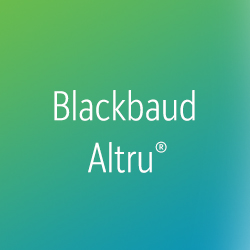Managing Odata And API Connections With Blackbaud ID
Published
This week, we are continuing our ongoing communication efforts to help prepare you for Single Sign-On. In today's blog we’ll discuss what kind of impact SSO will have on Odata and API connections. Over the next few days, we'll also discuss managing shared users and inviting users to Blackbaud.com in further detail.
Many of you have already been reaching out to ask questions about this topic, so if you use Odata or Altru’s API (or plan to in the future), please read on to find out what actions you may need to take after the update. Since there are a few different possibilities, we’ll break things down into three different scenarios below. The actions you’ll need to take will depend on what kind of setup you already have in place.
Scenario 1: I have a dedicated user for these connections (like OdataUser1234) that is not used to login to Altru
Many of you have already been reaching out to ask questions about this topic, so if you use Odata or Altru’s API (or plan to in the future), please read on to find out what actions you may need to take after the update. Since there are a few different possibilities, we’ll break things down into three different scenarios below. The actions you’ll need to take will depend on what kind of setup you already have in place.
Scenario 1: I have a dedicated user for these connections (like OdataUser1234) that is not used to login to Altru
- If you have a dedicated user, you will not need to change/update any credentials right away, as your existing Altru credentials will continue to work for Odata/API connections.
- However, because password resets used to be enforced every 90 days, you will eventually need to link the user to a Blackbaud ID at some point before that password expires. The great thing about changing over to a Blackbaud ID for these connections is that you'll no longer have to remember to reset the password for the account after a certain period of time.
- If you currently use the same username & password in your Odata/API connections that you also use to login to Altru, you will need to update those credentials after SSO is turned on, wherever the connections live.
- For example, on the day of the update I link my account JLewis1234 to my Blackbaud ID jillian.lewis@blackbaud.com. If I’m connecting to an Odata feed via Excel with that same user, I would then go into the Excel file and enter my newly linked Blackbaud ID and password.
- Again, with Blackbaud ID, passwords do not have any set expiration date, so there is no need to remember to change them after a certain period of time.
- Google authentication does not work with Odata or the API. When you use Google, we do not have access to their authentication information. As a result, we can't authenticate you as having permission to access in Altru.
- Because of this, you should plan on linking to a Blackbaud ID instead. Note: with Single Sign-On, you can still use a Google email address, but choose to authenticate your account with a Blackbaud ID.
- If you’ve already registered for a Blackbaud.com account using the ‘Sign in with Google’ option and want to switch, follow the steps in this KB article to make the change.
News
ARCHIVED | Blackbaud Altru® Tips and Tricks
08/22/2017 4:09pm EDT


Leave a Comment